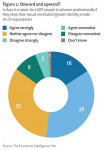Energy efficiency not yet on IT department’s radar, despite soaring energy prices and environmental concerns
However, rising energy costs and IT's growing demand for power is likely to put energy concerns higher on the agenda. The US Environmental Protection Agency (EPA) notes that servers and data centres in the US accounted for 1.5% of the country's total electricity consumption in 2006·more than double that consumed in 2000, and accounting for some US$4.5bn worth of electricity.
"Although concerns about energy efficiency and global warming are now high on the political agenda, the spotlight has not yet been turned onto the IT function," said James Watson, the report's editor. "This survey suggests that few firms have woken up to the fact that their IT infrastructure is already responsible for a significant proportion of their total energy costs."
In general, more than half of executives (54%) polled agree that their firm does not measure the environmental impact of its IT systems and policies·and just one-third (33%) say they do. In part, this is due to the lack of visibility about the issue: 64% agree that an industry standard on energy efficiency on IT equipment would cause them to change their procurement policies.
Richard Lanyon-Hogg, IBM Chief Technical Officer - Green Services, said: "There is a growing business need, and an emerging legislative one, for CIOs to look at their own organisations to ensure their IT systems and services are as energy efficient as possible. Recent client engagements and the Economist Intelligence Unit report confirm that despite this many organisations are unsure as to how to measure their IT carbon footprint and bring about sustainable improvements."
Other key findings from the report include:
· Most organisations appear to be paying lip-service to green issues. Although two-thirds of executives polled say that their organisation has a board-level executive responsible for energy and the environment, only 45% of firms have a programme in place to reduce their carbon footprint. And those that do have a carbon reduction strategy, the majority (52%) have no specific targets for it, although a small core (9%) aim to be carbon neutral by 2012.
· When it comes to IT procurement, power consumption is not a significant criterion right now. Reliability is the main deciding factor when buying IT equipment, according to 63% of respondents. This is followed by price (32%) and then after-sales support (30%). Despite rising energy costs, only 12% of respondents believe that the energy efficiency of IT equipment is a critical purchasing criterion. In comparison, 13% of executives rate delivery times as being a critical factor.
· However, IT holds much scope for improvement. Despite the current sense that little progress is being made, the IT function is well placed when it comes to reducing its environmental impact. By adopting existing energy efficiency methodologies and technologies, corporate servers and data centres could cut power use from current efficiency trends by 56% by 2011, according to the EPA. For the US alone, this would reduce projected electricity costs from some US$31bn to US$17bn, providing an obvious cost saving incentive·and also delivering a huge reduction in future CO2 emissions. Beyond the data centre, simple initiatives, such as switching off PCs when not in use and minimising unnecessary printing, can improve an organisation's green credentials and save money at the same time.
웹사이트: http://www.eiu.com
연락처
Edgar Fernandez
Marketing Manager, Asia-Pacific
(852) 2585 3826 이메일 보내기
Fax: (852) 2802 7007
이 보도자료는 Economist Intelligence Unit가(이) 작성해 뉴스와이어 서비스를 통해 배포한 뉴스입니다.




